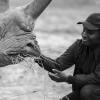Hi everyone,
My post is not about tech really, but about ethics in general.
I am Phyllis Masudi, a PhD candidate at Wageningen University and Research. I am from Kenya. I am currently working on a Deutsche Gesellschaft für Internationale Zusammenarbeit GmbH (GIZ) funded project that is focused on identifying the health risks associated with illegal wild meat trade in the Nairobi Metropolitan Area, a rapidly urbanizing city region in Sub-Saharan Africa. About a year ago, I conducted a field work exercise that entailed extensive key informant interviews aimed at mapping an illegal urban wild meat value chain to understand its operations, actors involved, governance as well as actors’ practices and perceptions that predisposes them to infections from wild animals and wild meat. Prior to and during this process, I had to seek several research ethical approvals, and permits to ensure this was a success, and most importantly, ethical. This was important as consumptive wild animal use in Kenya is illegal, thus our sample population was considered a vulnerable population. Engaging them in the study could also mean unintentionally exposing them to the authorities.
My experience with this was that despite it being a worthy process, it was still a time-consuming process, that involved several offices, mostly government. I understand that it can, at times, be difficult bringing government bodies on board when doing research, a factor that is mostly attributed to the misalignment between government and individual research priorities; sometimes mostly influenced by a country’s political environment. However, I was able to get all my permits. In the process, I learned how important, but tedious, the ethical process towards doing a study involving an illegal practice could be.
Through this post, I was hoping to learn more about other people’s experiences with regards to meeting the ideal ethical requirements when conducting research involving sensitive topics/illegal practices in conservation.
Have you conducted a study focused on conservation that involved people and you considered it very sensitive for some reason? Could you share your experiences, or any materials published from it? Did you have a special methodological approach to protect your sample population, in this case humans?
You can reach me via email [email protected] or [email protected]
3 April 2024 4:38pm
Hi Sherril,
I can't believe this was posted almost a month ago. And more surprising that there are no comments about it yet.
That experience you had is one of the kind, because most people in conservation don't get to deal with ethics and moral issues in the front line that often. It's just because most people do desk work. Including managing directors of projects deployed in remote places. I can relate your experience to any field, I would say it's almost a human behavior classics. I understand it can be frustrating and also a lonely journey. Myself I had experience a lot of that in the last years. To a point that I was almost quitting doing my best for conservation, I was burnt out for seeing that the reality was a very different picture from the marketing about it. But I feel fortunate that I have been observing these realities in the sector first-hand for long time now. And because I did it all independently and self funded I can speak my mind about it. Which there are not many people with that freedom I found out.
You talk about illegal practices, in countries where corruption seems more "brutal", for governments and organizations the fact that something is illegal can be pretty relative concept. And methods follow short when that is the case. Many times I observed apparent combat of poaching activities, but after years of observation and doing my own research it was clear that the local governments were pretty aware of illegal activities and just not being honest enough to address them. Mainly because the donors are far away, way removed from the realities in the front line, so the remoteness of some places allows for a very flexible understanding of ethics in some cases.
Your experience is very valuable, I'm glad to hear that you got the permits at the end. And good luck with your research, remember to write, record and share your experiences. There is a lot of people in the same situation. Stay independent, stay free, share your knowledge.
Best, Luciano
nowforwildlife.org





Luciano Foglia